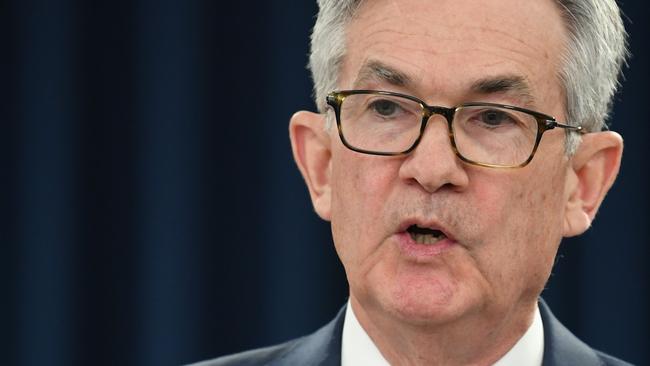Fed chair Jerome Powell says US faces long, uncertain recovery
Fed chair Jerome Powell says the US economy may not fully recover until a vaccine is found for COVID-19.

Federal Reserve Chairman Jerome Powell said the US economy could take more than a year to recover from the coronavirus-induced shock.
“It’s going to take a while for us to get back,” Mr Powell said in a rare television interview on the CBS News “60 Minutes” program.
“The economy will recover. It may take a while. It may take a period -- it could stretch through the end of next year. We really don’t know.”
Mr Powell was interviewed last Wednesday at the central bank’s Washington headquarters. CBS News on Sunday released an excerpt of the interview ahead of its evening broadcast.
Without a second wave of infections this year, Mr. Powell said was hopeful the economy could “recover steadily through the second half of this year,” adding: “For the economy to fully recover, people will have to be fully confident, and that may have to await the arrival of a vaccine.”
Measures to limit the spread of the coronavirus pandemic have frozen much commercial activity, leading to a sharp stop in economic output. The unemployment rate, which just three months ago sat near a 50-year low, jumped in April to its highest level since the Great Depression of the 1930s, wiping out a decade of job gains in a single month.
“This is a time of great suffering and difficulty and it’s come on so quickly and with such force that you really can’t put into words the pain people are feeling and the uncertainty they’re realising,” Mr Powell said. “But I would just say this: In the long run, and even in the medium run, you wouldn’t want to bet against the American economy.”
The Fed responded aggressively by slashing rates and buying more than $US2 trillion in Treasury and mortgage securities to stabilise financial markets. It has promised to lend trillions of dollars more, backed by more than $US200 billion in funds from the Treasury Department, to support businesses and state and local governments.
Congress has appropriated nearly $US2.9 trillion so far to support households, businesses, healthcare providers and state and local governments, or around 14 per cent of national economic output. But Mr Powell has warned that additional spending will be needed to prevent long-term damage from a wave of business bankruptcies and extended periods of high unemployment.
House Speaker Nancy Pelosi on Sunday urged Senate Republicans to take action on a $US3 trillion coronavirus-relief package that narrowly passed the House on Friday.
“They may think it’s OK to pause, but people are hungry across America,” she said on CBS. “Many of these people risk their lives to save lives and now they may lose their jobs.”
However, President Donald Trump has said the measure is “dead on arrival” in the GOP-led Senate and at the White House, which has urged a pause before passing another relief measure.
The latest House bill includes about $US1 trillion in direct aid to states and localities, including grants and education assistance, to deal with the effects of the pandemic. It would put a new round of one-time cash payments into Americans’ bank accounts, extend the duration of enhanced jobless benefits, help cover some rents and mortgages, forgive some student-loan debt and send premium pay to essential workers in fields such as health care.
While Republicans may support many of those allocations, some specific items are drawing strong protests. “Nancy Pelosi basically lost me with that package when she has $US1200 checks for illegal immigrants and it just goes downhill from there,” said Peter Navarro, a senior adviser to the president, during a Sunday interview on ABC’s “This Week.”
Mrs Pelosi said she expects to negotiate with Republicans and that there are “no red lines.” Part of the urgency is to get aid to first-responders, many of whom are at risk of losing their jobs if local authorities have to cut budgets, she said. The measure also puts forward a plan on testing, tracing, treatment and isolating the infected, she said.
“We have no idea the size of this challenge to our country because we have not sufficiently tested. Let’s test so that we can diagnose and then we can treat and then decrease the number of people” who are dying, she said.
Health and Human Services Secretary Alex Azar said day the Trump administration has set a goal for 300 million doses of a coronavirus vaccine to be available to the American people by the end of the year.
“It’s not a pledge, it’s a goal of what we’re going to mobilise the entire U.S. government and private sector to achieve,” Mr. Azar said on CBS’s “Face the Nation.”
He also defended the state governors moving to reopen their economies and end shelter at home orders.
“There should not be one-size-fits-all approaches to reopening,” he said. “I think in any individual instance you’re going to see people doing things that are irresponsible. That’s part of the freedom we have here in America...But we’ve got to get this economy and our people out and about, working, going to school again, because there are serious health considerations of what we’ve been going through.”
Dow Jones



To join the conversation, please log in. Don't have an account? Register
Join the conversation, you are commenting as Logout